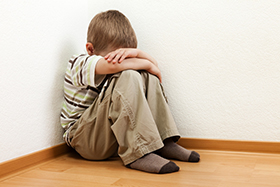
By Julie Garrison
A divorce is heart wrenching for the entire family. But dads can do a lot to make the entire process much easier for their children.
Consider these tips below to be the ten commandments of helping your children to cope with divorce.
Never make children choose sides. Both parents are of equal value, and should be treated as such. A child’s loyalty should be to both his or her mother and father. It does not matter how you feel or how deeply you have been wronged.
Don’t say bad things about your ex – ever. Remember, your children are not divorcing your soon-to-be ex. You are. So, don’t make the kids feel like they are rejected or should be angry about what only pertains to the two of you.
When you get into a conflict with your ex, don’t tell the kids about it. Maybe your ex is chronically late in picking up the kids for her parenting time. The temptation is to express your ongoing frustration to those nearest to you – the kids. But this undermines their healthy relationship with their mother. So, just avoid such frustrating talk with the kids altogether.
If the kids ask questions about a conflict between you and their mother, answer them in generic terms. Don’t give specifics, and don’t assign blame. Children figure many things out on their own, and they don’t need to feel bogged down by any additional issues, points of conflict or details that divide you and their mother.
Children are not carrier pigeons. Never ever use your children to transmit information or documents to their mother. Not only is this not the safest method, it puts an unfair amount of pressure on your kids when they are already trying to relate to all of these changes on their own.
Try to keep to a routine during parenting time. Routines bring children security and feelings of safety. Kids like to feel that they don’t have to worry over adult issues and can just enjoy being themselves. This becomes possible through thought-out and loving structure and consistency.
Expect your children to act out and be more emotional. Divorce shakes their very foundation. Over time, though, they will calm down and normalize emotionally. Make sure to listen to your children when they want to open up to you, and don’t be unjustly upset if they show signs of anger, sadness or frustration during this divorce process.
Don’t quiz your children on what goes on at your ex’s house. The only exception to this would be on subjects involving safety, alcohol/drug abuse or violence in the mother’s home. Otherwise, it is vital to remember that your kids are not your spies and not your intermediaries.
Seek help for your children. A family counselor is usually best. He or she can help your children express themselves and their feelings through play therapy, talk and more. A therapist provides a safe setting for your children to vent conflicting feelings and emotions as well as work out what they’ve been trying to communicate or say.
Work on how you express yourself to your ex. The big picture involves getting through the divorce and finding a new pathway to happiness. You will be far more self-satisfied and content in the long run if you and your ex find a way to deal with each other civilly and productively. Remember that, like it or not, your ex is going to be a part of your life for a long, long time. Learning to deal with her effectively in matters involving the children is better for everyone involved, especially your kids. If feasible, the two of you may consider seeking the help of a family counselor or mediator in learning how to communicate effectively with one another in matters concerning your kids.
The Bottom Line
No one goes into marriage to ultimately divorce. But with over 50 percent of all marriages ending in divorce, it is vital for parents to learn how to help their children cope if or when this does happen.
By serving as a good role model and putting the needs and feelings of your kids first during the divorce process, they will emerge happier and more secure.


Only in a perfect world
The most aggressive parent wins, and that is the one who usually believes that the best interest of the children is to be with them above all else. They will do anything to win. They will do all these things. You can choose to do the right things and lose a lot in court and authority with your kids, or the wrong thing and win time and keep authority. Most men I know try to do the right things, and get screwed in court. Custody fights in court need to go away. They are inappropriate, and if one parent is demonstrated to be criminally dangerous in a criminal court, then time should be split equally or by agreement, period.